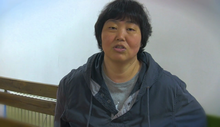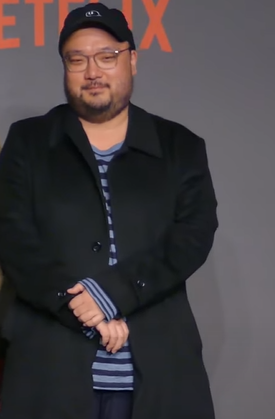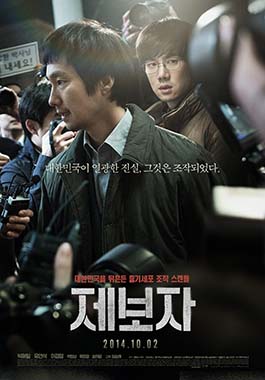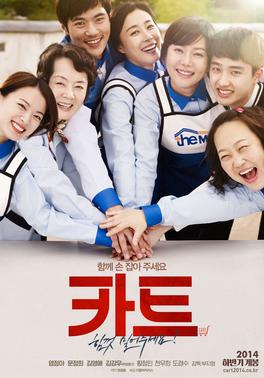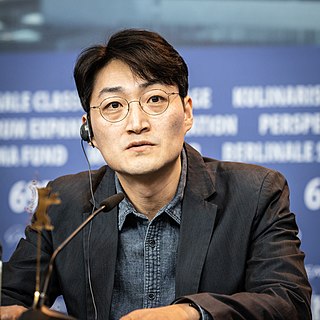Career
1994–1996: Promenade in the Rain and Three Friends
Upon her return to Korea in 1993, she worked as an assistant director on Yeo Kyun-dong's Out to the World . In 1994, she directed her first short film Promenade in the Rain, which won the Grand Prize and the Press Award at the 1st Seoul International Short Film Festival. [3]
She made her feature film debut with Three Friends (1996), which explored Korean masculinity and marginalization through the lives of three young men who have difficulty adjusting to the social system. It won the NETPAC Award at the 6th Pusan International Film Festival.
2001: Waikiki Brothers and Keeping the Vision Alive
Her second feature was Waikiki Brothers in 2001, a bittersweet drama about a struggling nightclub band that wanders from one small town to another for a gig. [4] It was the opening film of the 2nd Jeonju International Film Festival. [5] [6] Despite low ticket sales, Waikiki Brothers drew critical acclaim, with film critic Shim Young-seop praising Yim's use of long takes as a manifestation of the director's deep love for her characters. [7] [8] Yim won Best Screenplay at the 9th Chunsa Film Art Awards and Best Director at the 21st Korean Association of Film Critics Awards in 2001, while Waikiki Brothers won Best Film at the 38th Baeksang Arts Awards in 2002. And with its cult following, the film was later adapted into the stage musical Go! Waikiki Brothers! in 2004. [9]
Yim's follow-up was the documentary Keeping the Vision Alive: Women in Korean Filmmaking (2001), an homage to both pioneers such as Park Nam-ok and Hwang Hye-mi, and contemporary directors like Byun Young-joo and Jang Hee-sun. Through images and interviews, Yim's camera unobtrusively let the women filmmakers discuss their experiences, struggles and survival in the male-dominated, conservative and sexist Korean film industry. [10]
2009–2010: Fly, Penguin and Rolling Home with a Bull
In 2009, Yim again collaborated with the NHRCK with her fourth feature Fly, Penguin. The film is composed of four segments which tackle issues such as a mother's obsession with her son's English education, the ostracism at work of an office employee because he's a vegetarian and doesn't drink alcohol, the estrangement of a man from his family whom he financially supports overseas, and divorce between a couple in their sixties. [23]
Her fifth film Rolling Home with a Bull (2010) was adapted from Kim Do-yeon's novel about a failed poet who goes on a road trip across rural Korea with a recently widowed ex-girlfriend and his father's cow that he plans on selling. Yim said, "Although the novel is based on a Buddhist pilgrimage, I thought it could be developed into an unconventional love story." [24]
2011: Sorry, Thanks
In 2011, Yim, an animal rights activist, produced the omnibus film Sorry, Thanks (also known as Thank You and I'm Sorry), in which four directors explored the relationship between humans and their pets. In Yim's short film Cat's Kiss, a father is at odds with his daughter because of her propensity for collecting stray cats, until he finds himself growing to care for them. [25]
Later that year, she directed a Korean dubbed version of the 2002 Japanese film Oriume, which depicts a family's struggle to cope with an elderly relative who is afflicted with Alzheimer's disease. [26]
In 2012, Yim executive produced Lee Kwang-kuk's debut film Romance Joe , [27] and appeared in Heo Chul's documentary Ari Ari the Korean Cinema.
2013: South Bound
Yim's next feature was South Bound (also known as Run to the South) in 2013. Adapted from Okuda Hideo's novel, the protagonist is a man with an outspoken nature and disdain for mainstream society who decides to relocate his family to a remote island off the south coast of Korea. But their dream of a happy and sustainable life free from governmental authority is ruined when they clash with a powerful politician who has plans of developing their island into a holiday resort. [28]
The film received criticism from some quarters that opined it was overly politicized with its anti-establishment and anti-capitalist tone as well as its parallels to the Jeju Naval Base, [29] but Yim said she "tried to deliver the story as joyfully as possible" with a light-hearted approach despite its weighty themes of individual freedom, national duty, and familial separation. She said further, "Our society is full of uncertainties and ferocious competition. "The South" here means an ideal land. Every one dreams of an ideal place, but only a few manage to fulfill their dream. The family in South Bound is willing to step ahead and achieve what they want by breaking away from social norms and traditions." [30]
2014: Whistle Blower
In 2014, Yim directed Whistle Blower , based on the real-life events surrounding Hwang Woo-suk, then a biotechnology professor at Seoul National University who gained international renown in 2004 after claiming that he had successfully carried out experiments cloning human embryonic stem cells. After a whistleblower anonymously tipped off a local investigative journalism program, it was revealed that Hwang's research had been fabricated and unethical, in one of the biggest scientific frauds in recent history. [31]
In her fictionalized version, Yim said that one of the challenges was portraying the scientist as multidimensional, but that her focus was on the image of a journalist who rightfully battles for the truth, despite political pressure and public condemnation. [32] [33]
2018: Little Forest
After a short hiatus, Yim directed Little Forest , in 2018. It was adapted from a manga series of the same name by Daisuke Igarashi. It was first published in 2002. Little Forest is a story of a young woman who returns to her childhood home, in a traditional Korean village, after leaving for the big city in pursuit of what turned out to be an elusive dream. When she gets home, her mother isn't there – but her mother's "Little Forest", the many ways in which a single mother successfully made a home for her much loved child, unfurl with a long succession of lovingly sketched details involving mostly food preparation.The unfurling moments are lightly but lovingly shared with two childhood friends, one of whom also abandoned their elusive dream of success in the big city (Seoul) and the other who is still pursuing the small-town equivalent of that elusive dream—without ever leaving home. In an interview with View of Korean Cinema, Yim said that she wanted to make Little Forest because it deviated from the mainstream Korean cinema that was over-saturated with very violent and big-budgeted films. She said, "I wanted to make a small film, a film which can heal and soothe the young generation of Korea, who is currently going through hard times. [34]
